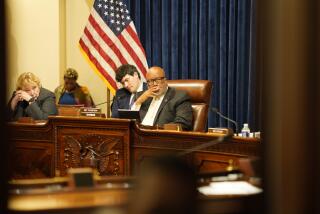Gulf Illness Clues Sought in General’s Notes
- Share via
WASHINGTON — The Senate Veterans Affairs Committee on Thursday won permission to examine the personal Persian Gulf War notes of retired Gen. H. Norman Schwarzkopf in its search for clues on whether U.S. troops were exposed to chemicals or other toxic agents during the 1991 war.
Schwarzkopf, the senior commander of allied troops in the war, said that he would allow congressional and Pentagon investigators to look at the volumes of material “to their hearts’ content.” But he angrily rejected implications that he may have covered up information on toxic exposures.
News of the request came on the first day of hearings by the committee on the issue and offered fresh evidence that Capitol Hill critics, including Chairman Arlen Specter (R-Pa.) and ranking minority member John D. “Jay” Rockefeller IV (D-W.Va.), suspect the military still is concealing facts that bear on the search for causes of the so-called Gulf War syndrome.
“This is a very serious matter, and a very serious log, which was evidently not at the disposal of [the CIA] or the Department of Defense,” Rockefeller said at the hearing.
Gulf War syndrome is the generic term for the variety of illnesses and ailments that has afflicted thousands of Gulf War veterans since they returned from the conflict.
Investigators have been seeking for years to piece together data on the exposure of the 670,000 U.S. troops to nerve gas and other dangerous agents during the war.
Rockefeller and Specter said that they believe more clues may be found in Schwarzkopf’s volumes of notes, which were compiled by an officer who sought to record every detail of every conversation the general had between August 1990 and August 1991. The record totals 2,250 pages.
In particular, the senators hope they can find information to fill in a gap in records on chemical exposures during an eight-day period in March 1991, when U.S. engineers blew up nerve-gas weapons in an Iraqi storage facility in Kamisiyah, Iraq. U.S. troops intermittently compiled data on such chemicals on a laptop computer, but there are gaps in the data, including for the eight-day period.
At the Pentagon, spokesman Kenneth Bacon told reporters that he thought inquiries about the logs were “a wild goose chase, frankly, on your part, and on the parts of Sen. Rockefeller and Sen. Specter.” He noted that this week, the president’s commission on Gulf War syndrome reported that “there’s been no cover-up.”
Schwarzkopf repeatedly has denied that the troops suffered nerve-gas exposure and asserted Thursday that officials would find no such indication in the notes kept at his office in Tampa, where he now lives.
“There is nothing in those logs at all about chemical contamination of my troops,” Schwarzkopf told the Associated Press. “If you don’t believe me, I welcome a member or member of their staff to come down to my office in Tampa and they could look through those logs to their hearts’ content.”
Schwarzkopf has retained control of the notes over the objections of critics who contended that, since they were compiled by a military officer, they are government property. The Pentagon’s inspector general ruled in 1994 that the general can keep them.
In 1994, Schwarzkopf provided the government with an edited version of the notes that omitted what he described as accounts of candid and sensitive conversations with foreign leaders. Schwarzkopf is using the material to write a book on his experiences in the war.
Schwarzkopf called the Pentagon to offer access to the information after learning that Rockefeller had written defense officials in December seeking access to them.
Rockefeller also has indicated that he believes the government is entitled to take possession of the documents and not simply review them at Schwarzkopf’s office.
More to Read
Get the L.A. Times Politics newsletter
Deeply reported insights into legislation, politics and policy from Sacramento, Washington and beyond. In your inbox twice per week.
You may occasionally receive promotional content from the Los Angeles Times.










